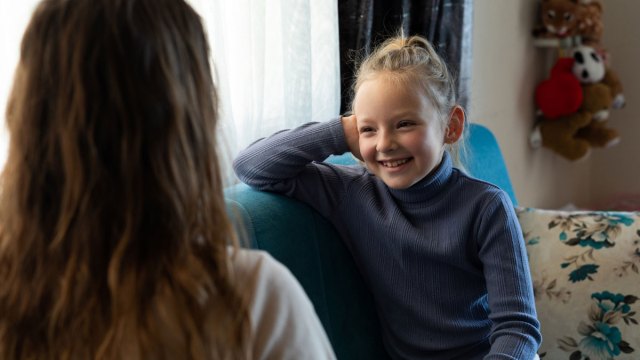With therapy, my daughter became empowered. She walked into school each and every day with her head held as high as the trees.
“Can you find me a therapist, Mom?” my daughter asked while calming down after an emotional episode.
She’s eight.
“Of course, honey,” I said.“I need help with my emotions,” she said. “And I don’t even know who I am.”
Shocked by her self-awareness, I tried putting my eyes back into my head. To me, my eight-year-old was wiser than most adults I know. She wanted to help herself evolve, and overall, just learn how to be better. And while our culture has grown in regards to accepting therapy, it can still feel stigmatized—especially for kids.
I mean, adults getting therapy? Sure. That’s widely accepted now for the most part. But kids? They only go to therapy after trauma, right? I feared that’s how society still viewed it. I felt that some people wouldn’t quite understand and that my parenting would be judged.
But when I told some of my closest friends, their responses felt like a gift. I’ll never forget their gentleness: “Wow, we could all learn a thing or two from your daughter” and “I think your daughter just inspired me to go to therapy.”
So, we got started. Initially, I sat with my daughter to make her more comfortable; yes, I was learning right along with her. After the first few sessions, I noticed my daughter begin to take control of her emotions instead of her emotions taking control of her.
You see, she was having a pretty rough year at school. Between a cruel teacher who ended up quitting in the middle of the school year and some girls who had been bullying her, her usual bright spirits were dimming. After a while, things grew too heavy for her, and her emotions began to spiral—daily.
But with therapy, she became empowered. She walked into school each and every day with her head held as high as the trees. Sure, her days weren’t perfect. But my daughter learned how to navigate those uneasy moments. Instead of coming home with those big emotions, she could put out the smoke within her before it turned into a forest fire.
Related: 5 Ways to Help Your Kid Become Their Own Mental Health Advocate
As her parent, I was able to stay regulated, too. Before therapy, it was difficult for me to sit with her during one of those intense episodes. There were times I’d simply feel so stressed that I was unable to calm her that I’d either raise my voice or use a sterner tone than she deserved. But therapy has taught us both that while big emotions can be tough to get a handle on, they’ll pass if we let them. They’re not something that will stay inside our bodies forever. We can simply acknowledge them and then give them permission to move along. Together, my daughter and I have been able to accomplish this.
I’m happy to report that her joy is back. She is bright when she bounds into the car after school. She’s able to tackle both the small and big problems of her days. And she now knows that she can manage her uncomfortable feelings.
I get why someone may feel shame sending their child to therapy without their having a traumatic experience to work through. Unfortunately, society has set us up to believe that we should be able to handle ourselves and that we should be in control of our children. But those days of martyrdom need to be over.
Therapy not only helps our children, but it shows that it’s OK to ask for help. Asking for help in any situation or phase in life demonstrates a real vulnerability and compassion for oneself. And isn’t that what should aspire to teach our kids? To love themselves?
At the end of the day, therapy has empowered our family to be vulnerable with one another. Because we now know, it will only make us stronger. So, let’s say it out loud: my little kid goes to therapy—and it’s awesome.











